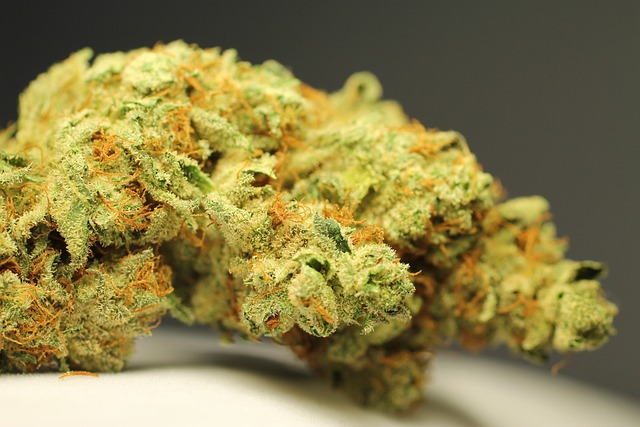Δ9-tetrahydrocannabinolic acid (THCA), the non-psychoactive compound found in certain THCA-rich cannabis concentrates like wax, shatter, and live resin available for sale, offers potential therapeutic benefits such as pain relief and anti-inflammatory effects. These high-potency products should be used with caution due to their strong effects and the possibility of side effects like dizziness, paranoia, and anxiety, which can intensify with higher doses. New users are advised to start with small amounts to gauge individual sensitivity. It's crucial for consumers to purchase these concentrates from reliable sources and to consult healthcare providers, especially if they have existing health concerns or are taking other medications. THCA-rich cannabis concentrates available for sale can influence various aspects of health, including pain management and mood regulation, but their use should be informed by a comprehensive understanding of their effects and interactions within the body. Potential users must consider their unique health profiles and seek professional advice to ensure safe and effective incorporation into a wellness regimen.
Exploring the therapeutic properties of cannabinoids has led to increased interest in THCA-rich cannabis concentrates, now widely available for purchase. This article delves into the potential side effects associated with these potent compounds, offering a thorough examination for those considering incorporating them into their wellness routine. We’ll guide you through understanding the nuanced effects of THCA flower and its implications for health, backed by scientific evidence. Join us as we navigate the complex landscape of THCA rich cannabis concentrates sale and their impact on consumers.
- Unveiling the Potential Side Effects of THCA-Rich Cannabis Concentrates: A Comprehensive Guide
- Navigating the Nuances: Understanding THCA Flower and Its Impact on Health and Well-being
- The Science Behind THCA and Its Association with Reported Side Effects
Unveiling the Potential Side Effects of THCA-Rich Cannabis Concentrates: A Comprehensive Guide

Navigating the effects of THCA-rich cannabis concentrates requires a nuanced understanding of their potential side effects, given their potency and distinct chemical profile compared to their decarboxylated counterparts. THC acid (THCA), the non-psychoactive precursor to THC found in raw cannabis or concentrated forms, may exhibit different effects upon consumption. While many users report therapeutic benefits from THCA, such as pain relief and anti-inflammatory properties, it’s crucial to be aware of its side effects, which can include dizziness, paranoia, anxiety, and potential psychoactive effects when decarboxylated. Users new to THCA-rich concentrates should approach them with caution, starting with small doses to gauge individual sensitivity. The concentrates, available for sale in various forms like wax, shatter, or live resin, offer a concentrated dose of cannabinoids and terpenes, which can intensify both the desired effects and any potential negative experiences. It’s advisable for consumers to seek products from reputable sources and consult with healthcare professionals before incorporating THCA-rich concentrates into their wellness routine, especially if they have pre-existing health conditions or are taking other medications. Understanding the nuances of THCA’s effects is key to a safe and positive experience with these potent cannabis derivatives.
Navigating the Nuances: Understanding THCA Flower and Its Impact on Health and Well-being

Navigating the intricacies of THCA-rich cannabis concentrates requires a discerning approach, as the health and wellness implications of this compound are multifaceted. Tetrahydrocannabinolic acid (THCA), the precursor to THC found in raw cannabis or cannabis that has not been exposed to heat or light, exhibits unique properties distinct from its psychoactive counterpart. Consumers interested in the potential benefits of THCA-rich products may find these concentrates on sale, offering a concentrated form of the cannabinoid for those seeking its effects without the psychotropic influence of THC. Studies suggest that THCA may have anti-inflammatory and neuroprotective qualities, making it an object of interest for those exploring alternative health solutions. Its potential to interact with the body’s endocannabinoid system could influence various physiological processes, from pain management to mood regulation. As such, individuals considering the incorporation of THCA-rich cannabis concentrates into their wellness routine should approach this decision with a comprehensive understanding of its effects and any potential side effects, especially given the nuanced nature of cannabinoid interactions within the human body. It is advisable to consult with healthcare professionals, particularly before combining these products with other medications or treatments. With an array of THCA-rich cannabis concentrates now available for sale, consumers have access to a range of options tailored to their specific needs and preferences, ensuring informed and safe choices in the pursuit of health and well-being.
The Science Behind THCA and Its Association with Reported Side Effects

Delta-9-tetrahydrocannabinolic acid (THCA) is the non-psychoactive precursor to the well-known psychoactive cannabinoid, delta-9-tetrahydrocannabinol (THC). Found abundantly in raw cannabis plants and certain THCA rich cannabis concentrates for sale, THCA interacts with the body’s endocannabinoid system through its receptors, primarily CB1 and CB2. This interaction is pivotal in eliciting various therapeutic effects, including anti-inflammatory, analgesic, and neuroprotective properties, which are under extensive scientific investigation.
While THCA is often lauded for its potential health benefits, it’s also associated with a spectrum of side effects, much like any other bioactive compound. The reported side effects stem from the cannabinoid’s interaction with various bodily systems. Users may experience mild to moderate side effects such as dry mouth, red eyes, and slight dizziness or lethargy, which are often temporary and subside after adjustment to its use. However, adverse reactions can also include psychoactive effects in certain strains, despite THCA not being intoxicating on its own. These side effects highlight the need for careful dosing and individual consideration when incorporating THCA rich cannabis concentrates into one’s regimen. It’s crucial for consumers to approach these products with an understanding of their body’s response and to consult healthcare professionals, especially if they have underlying health conditions or are taking other medications.
In conclusion, thorough exploration of the potential side effects associated with THCA-rich cannabis concentrates underscores the importance of informed consumption. As detailed in this comprehensive guide, individuals considering THCA flower should be aware of its distinct impact on health and well-being. The scientific evidence suggests that while THCA offers various benefits, it may also trigger certain side effects that can vary from person to person. For those interested in purchasing THCA rich cannabis concentrates, it is crucial to approach such products with caution and due diligence, ensuring they are sourced responsibly and used within recommended guidelines. By understanding the nuances of THCA, consumers can make informed decisions that align with their health objectives and personal experiences.
